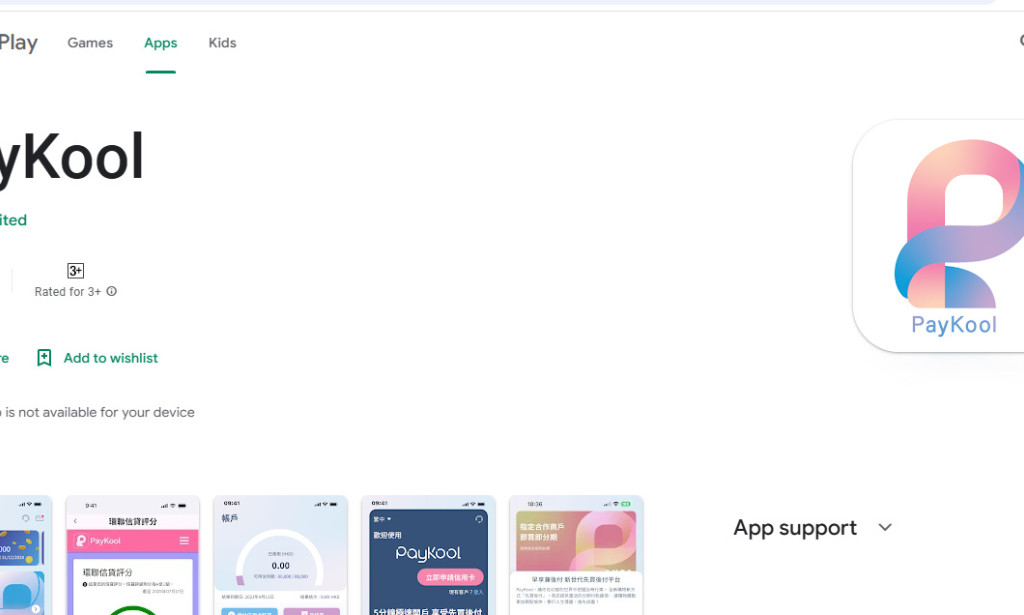Paykool (or “Pay Kool”) – Scam or Legit? The Full Investigation
Paykool, sometimes stylized as Pay Kool, is presented as a payment and cashback platform operated by an entity called K Cash. The app claims to allow users to deposit funds, make payments, and earn cashback or reward points on purchases. On the surface, it may look similar to legitimate e-wallet apps like PayPal or Alipay—but the deeper we dig, the more serious red flags appear.
What Paykool Claims to Offer
-
Deposit your real money into the Paykool wallet.
-
Use Paykool to pay for purchases, bills, and services.
-
Earn cashback, points, or rewards from these transactions.
-
Possibly earn extra incentives for reaching “high point totals.”
Ownership and CEO Information
-
Listed Owner: The app claims to be part of K Cash, which presents itself as a “listed company.”
-
Transparency Issue: There is no verifiable public record linking “K Cash” in this context to any reputable financial institution or stock exchange listing.
-
Possible Shell Entity: Multiple reports suggest the name “K Cash” may be used by unrelated scam wallets in different regions.
-
CEO & Leadership: No verified CEO, COO, or executive names are publicly provided on the official app page or website, which is highly unusual for a legitimate fintech company.
How Paykool Likely Makes Money
-
User Deposits – The app’s main income source seems to be from people depositing money into their wallet, which can then be withheld or frozen.
-
Transaction Fees – If real payments are processed, they may earn a small commission per transaction.
-
Interest or Float – Holding onto large sums of deposited cash could generate interest for the operators.
-
Potential Ponzi Elements – Some reports suggest rewards are funded by new user deposits rather than genuine merchant partnerships.
Major Red Flags
-
No Regulatory License – No evidence that Paykool is licensed as a payment processor or e-wallet by any government authority.
-
No Public CEO or Management Info – Legitimate fintech companies have transparent leadership; Paykool hides its executives.
-
Deposit-Heavy Business Model – The app strongly encourages users to deposit money before any real benefit is provided.
-
Risk of Frozen Accounts – Users report sudden account closures or frozen funds with vague claims of “suspicious activity.”
-
No External Audit or Security Certifications – No verified security measures like PCI DSS compliance, which is industry standard.
-
Copycat Branding – The name “Paykool” is dangerously similar to well-known legitimate fintech names, possibly to mislead users.
Is Paykool a Scam or Legit?
-
As a payment app: The lack of licensing, transparency, and consistent payout reports strongly suggests it is not trustworthy.
-
As a money-making tool: Extremely risky. Depositing large sums exposes you to potential total loss if the operators disappear or freeze your account.
Safe Alternative for Earning Real Money
Instead of risking your funds in a high-risk wallet app like Paykool, consider using a verified platform with proven payouts such as LODpost.com.
Why LODpost.com is Safer
-
Earn from content creation, not risky deposits.
-
No need to trust your life savings to a third-party wallet.
-
Transparent payout methods (PayPal, bank, crypto).
-
No hidden “account freezing” rules.
-
100% free to start.
💻 Sign up here: https://lodpost.com/register
Final Advice
If you still choose to test Paykool, never deposit all your savings. Keep most of your funds in your bank account or physically with you. Once money is in Paykool, it can be gone in seconds if the platform decides to lock you out.
If your real goal is earning extra income, stick with transparent, regulated, and proven platforms like LODpost.com instead of risking being part of a wallet scam trap.



You must be logged in to post a comment.